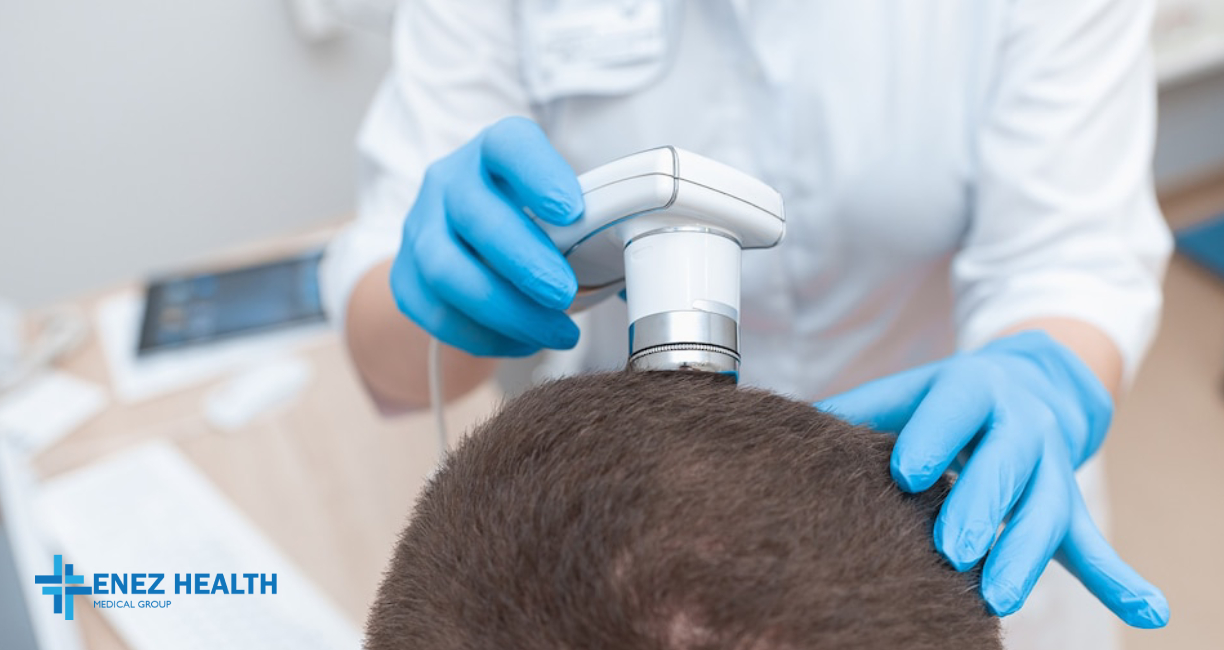
Recently, hair loss is an important problem that develops at early ages. Hair loss, is first manifested by thinning and recession of anterior hair line and primary etiological factors are genetics for men and hormonal disorders and some diseases for women. It is also referred as “Alopecia” in medical language. Hair loss is caused by many reasons.
Loss of mean 50 to 100 hair strands per day is accepted as a physiological process. One should concern about “a problem”, if more than 100 strand is lost every day or new hair looks weak or thin. As the case for all creatures, our hair is born, grows and dies (is lost). Approximately 90% of hair in our scalp is in the growth stage. This period lasts for 1 to 6 years. Rest hair is at the unproductive period and hair is lost at this stage. As evident by this natural process, hair is absolutely lost once every 3 to 4 years and new hair grows subsequently. Seasons pose significant effect on this physiological hair loss.
FUE METHOD FOR HAIR TRANSPLANT
Hair follicles are harvested in isolated, double or triple follicular units using a micromotor that has special bits, measuring 0.8 to 1.1 mm in diameter, with no need to stitching and no scar tissue. Follicular units (grafts) are collected from posterolateral parts of the scalp and transferred to the recipient area. Local anesthetic agent is instilled to donor and recipient areas. This method does not require stitching and does not cause scar on the scalp.
FUE method allows transplantation of chest and back hair. Those hair adapts to features of hair at the transplant site and survives with the same appearance. It is rather preferred for eliminating regional hair loss. In the FUE technique, 1000 to 2.800 hair grafts or 2.500 to 7.500 strands are transferred in a single session.
Although FUE method allowed collecting 600 to 700 grafts in approximately 8 hours per day using non-motor micro-devices and required long time, such as 3 to 4 days, to complete the treatment several years ago, recently, use of micromotor enables us to collect so many graft in 4 to 5 hours in the same day. Micromotor system equaled this method to the FUT method that is preferred due to ability to collect many grafts.
Diagnosis is made and best personalized treatment is determined, after you are examined by a specialist. You can schedule an appointment in order to consult with our physicians whenever you want.
Appropriate age limit for hair transplant:
Currently, hair transplant is ethically appropriate at age of >22 years, if it is necessary. Hair transplant surgery can easily be performed after age of 22 years. Upper limit may be 30, 40, and 50 ages. Therefore, hair loss can be managed, even if you are 80 to 90 years old.
Hair transplantation in women:
As is the case with all other issues, women are far more lucky than men in this field. Because they usually do not suffer from male-type hair loss. Women experience unique hair loss. We can stop and reverse hair loss in 80-90% of the cases, if hair transplant is unnecessary. If other hair therapies do not help or are not efficient, women can also be transplanted hair.
Tags: Hair Transplant, Hair Transplant Center, Hair Transplant Department, Hair Transplantation, Hair Transplant in Istanbul, Hair Transplant in Turkey
- Aeromedical Center
- Aesthetic, Plastic & Reconstructive Surgery
- Algology
- Allergy Immunology
- Anesthesiology and Reanimation
- Biochemistry and Molecular Biology
- Cardiology
- Cardiovascular Surgery
- Check up
- Chest Diseases
- Chest Surgery (Thoracic Surgery)
- Dermatology
- Ear, Nose & Throat
- Emergency Service
- Endocrine and Metabolic Disorders
- Endocrinology, Diabetes and Metabolic Diseases
- Eye Health & Diseases
- Gastroenterological Diseases and Surgery
- Gastroenterology
- General Surgery
- Genetic Disease Diagnostic Center
- Hair Transplant Center
- Hand and Microsurgery
- Hematology
- Hemodialysis
- In Vitro Fertilization (IVF)
- Infectious Diseases and Clinical Microbiology
- Intensive Care
- Internal Diseases
- Interventional Radiology
- Laboratory Services
- Medical Oncology
- Microbiology
- Neonatal Intensive Care Unit
- Nephrology
- Neurology
- Neurosurgery
- Nuclear Medicine
- Nutrition and Diet
- Obesity Surgery
- Obstetrics and Gynecology
- Oral And Dental Health
- Organ Transplantation Centers
- Orthodontics
- Orthopedics and Traumatology
- Pathology
- Pediatric Allergy and Immunology
- Pediatric Cardiology
- Pediatric Endocrinology
- Pediatric Gastroenterology, Hepatology & Nutrition
- Pediatric Health and Diseases
- Pediatric Hematology
- Pediatric Intensive Care
- Pediatric Nephrology
- Pediatric Neurology
- Pediatric Oncology
- Pediatric Surgery
- Pediatric Urology
- Perinatology
- Physical Therapy and Rehabilitation
- Podology
- Psychiatry
- Psychology
- Radiation Oncology
- Radiology
- Rheumatology
- Stroke Center
- Urology

